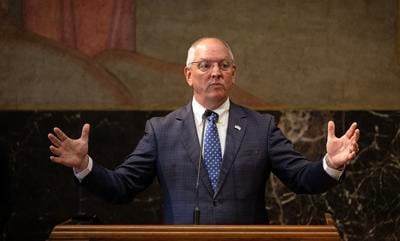Tuesday, the Republican-dominated Legislature pulled what was essentially a power play over Democratic Gov. John Bel Edwards, when it overrode his veto of a high-profile bill banning gender-affirming care for transgender kids — a bill he’d fought at every step of the process.
Not 24 hours later, on his monthly radio call-in show, Edwards took what sounded at least a little bit like a victory lap.
It wasn’t that Edwards didn’t care about the bill that will now become law — if the courts don’t strike it down first, a real possibility. By all appearances, he cares deeply about the vulnerable kids who’ll be harmed by the measure, which, he explained over and over again, serves no state interest and interferes with parents’ ability to decide what’s best for their kids. Edwards issued a six-page veto message outlining his reasons for opposing it, and likened this and other bills targeting LGTBQ kids to an earlier generation’s opposition to the Civil Rights Movement. He’s right.
But a broader view of not just this year’s legislative battles but all eight years of the Edwards era shows how rare Tuesday’s loss was. In all, Edwards told listeners, he’d vetoed 319 bills and budgetary line items in his two terms, during which he served with Republican legislative majorities, and been overridden just twice.
That works out to a 99.4% success rate, thank you very much.
Other governors could boast even higher rates, of course, but they served in different times and under different circumstances.
Edwards was an unlikely governor in an era in which Louisiana and other Southern states were hardening into solid GOP bastions. The type of partisanship that’s now the norm in Washington was filtering down the states. Perhaps even more unlikely was that he’d end his term, by this measure anyway, on such a strong note.
On policy, that mattered. Some genuinely bad bills got majority support during this year’s session but not the two-thirds needed to ultimately override gubernatorial vetoes, including two other anti-LGBTQ bills aimed at kids, one to bar classroom discussion of gender identity and sexual orientation and another to govern what pronouns teachers can use to refer to their students.
Also not becoming law is an attempt to limit public access during police investigations, and a bill to prevent public health-minded vaccine mandates in schools.
Previously, Edwards has successfully used his veto power to prevent citizens from being allowed to carry concealed firearms without permits or training; the Legislature upheld his veto of that measure in 2021, the first of three consecutive years in which they convened for veto sessions, and failed to pass similar bills in subsequent years.
It would probably surprise casual followers of the Louisiana Legislature to learn that veto …
It doesn’t seem random that the two bills that Republicans did pass over Edwards’ veto were intensely partisan. The first, last year, kept Louisiana’s congressional district map largely in place, with five majority White districts and one majority Black one, despite a population that is about a third Black. On top of the usual pressure to protect incumbents, GOP lawmakers also surely felt compelled to keep all five current Republican members in office, at a time when adding just a handful of potentially Democratic seats might cost Republicans their narrow House majority.
And the transgender bill is nothing short of a nasty national rallying cry for social conservatives — not to mention a campaign plank for the likes of Attorney General and gubernatorial candidate Jeff Landry, who celebrated the override by posting a video boasting that lawmakers had actually protected, not attacked, children.
On his radio show, Edwards noted that the first override has already been negated by the U.S. Supreme Court on Voting Rights Act grounds, and that Louisiana will get new districts before the next election despite the Legislature's wishes. He said he hopes the courts will block the transgender bill too — and said that in private conversations, some lawmakers who voted to override told him they hope so as well. Real profiles in courage, those folks.
Despite Tuesday’s loss, Edwards’ winning veto percentage makes you wonder if he could have blocked even more harmful legislation. He infuriated some of his most loyal supporters when he signed anti-abortion legislation that criminalizes doctors and doesn’t offer exceptions for of rape and incest. And for all his well-placed condemnation of culture war distractions from Louisiana’s real problems, he did sign a hotly contested measure that grew out of the right-wing war on libraries. You’ve also got to wonder if he could have gotten more of his own priorities through, like the minimum wage hike he endorsed in both of his winning campaigns.
Or maybe he’s got his finger on the state’s pulse and understands just how far he can realistically push an agenda as a member of the political minority.
If that’s disappointing to some of his backers, they really wouldn't like the alternative.


